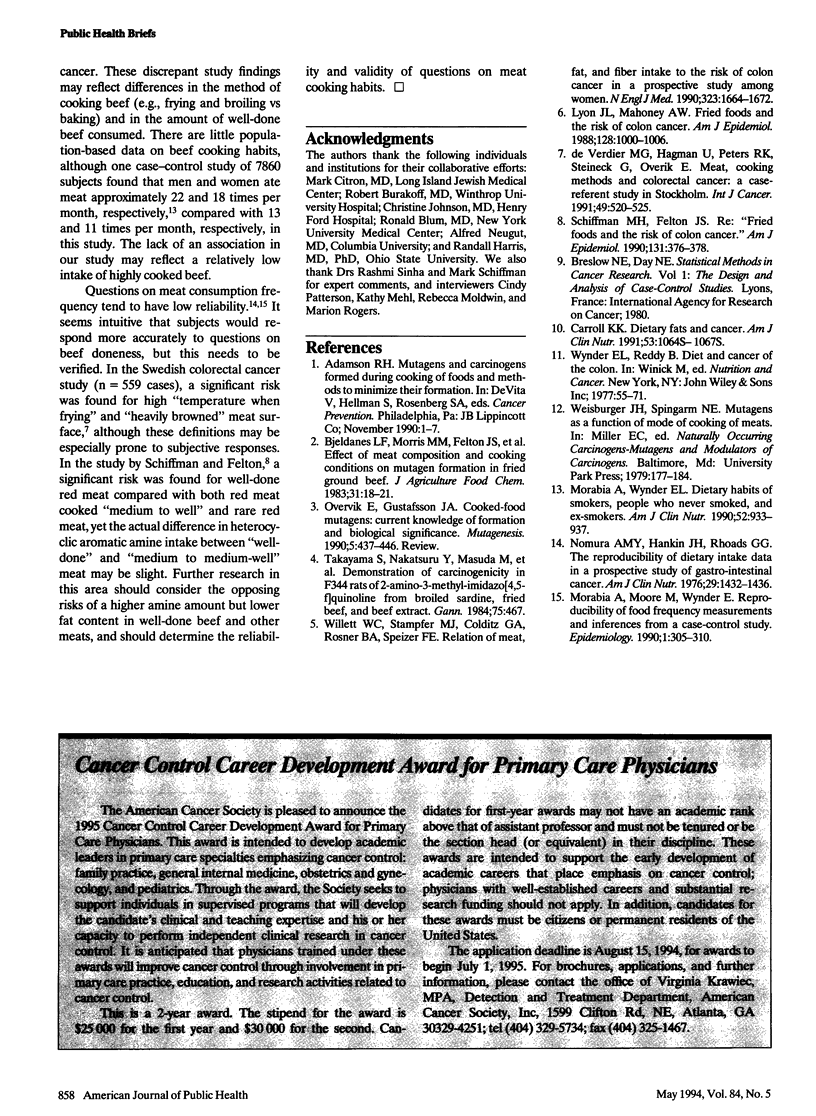Abstract
Heterocyclic aromatic amines and polycyclic aromatic hydrocarbons are mutagens that are produced in highly cooked meats. A case-control study of 511 patients with colorectal cancer and 500 matched control subjects examined whether consumption of well-done cooked beef is related to the risk of developing large bowel cancer. Approximately 16% of men and women consumed well-done beef, and 50% ate medium-cooked beef. For both sexes, there was no association between consumption of well-done or medium-cooked beef and colorectal cancer. This paper discusses whether questionnaire data accurately reflect dietary intake of heterocyclic aromatic amines and polycyclic aromatic hydrocarbons.
Full text
PDF


Selected References
These references are in PubMed. This may not be the complete list of references from this article.
- Bjeldanes L. F., Morris M. M., Timourian H., Hatch F. T. Effects of meat composition and cooking conditions on mutagen formation in fried ground beef. J Agric Food Chem. 1983 Jan-Feb;31(1):18–21. doi: 10.1021/jf00115a005. [DOI] [PubMed] [Google Scholar]
- Carroll K. K. Dietary fats and cancer. Am J Clin Nutr. 1991 Apr;53(4 Suppl):1064S–1067S. doi: 10.1093/ajcn/53.4.1064S. [DOI] [PubMed] [Google Scholar]
- Gerhardsson de Verdier M., Hagman U., Peters R. K., Steineck G., Overvik E. Meat, cooking methods and colorectal cancer: a case-referent study in Stockholm. Int J Cancer. 1991 Oct 21;49(4):520–525. doi: 10.1002/ijc.2910490408. [DOI] [PubMed] [Google Scholar]
- Lyon J. L., Mahoney A. W. Fried foods and the risk of colon cancer. Am J Epidemiol. 1988 Nov;128(5):1000–1006. doi: 10.1093/oxfordjournals.aje.a115044. [DOI] [PubMed] [Google Scholar]
- Morabia A., Moore M., Wynder E. L. Reproducibility of food frequency measurements and inferences from a case-control study. Epidemiology. 1990 Jul;1(4):305–310. doi: 10.1097/00001648-199007000-00008. [DOI] [PubMed] [Google Scholar]
- Morabia A., Wynder E. L. Dietary habits of smokers, people who never smoked, and exsmokers. Am J Clin Nutr. 1990 Nov;52(5):933–937. doi: 10.1093/ajcn/52.5.933. [DOI] [PubMed] [Google Scholar]
- Nomura A., Hankin J. H., Rhoads G. G. The reproducibility of dietary intake data in a prospective study of gastrointestinal cancer. Am J Clin Nutr. 1976 Dec;29(12):1432–1436. doi: 10.1093/ajcn/29.12.1432. [DOI] [PubMed] [Google Scholar]
- Overvik E., Gustafsson J. A. Cooked-food mutagens: current knowledge of formation and biological significance. Mutagenesis. 1990 Sep;5(5):437–446. doi: 10.1093/mutage/5.5.437. [DOI] [PubMed] [Google Scholar]
- Schiffman M. H., Felton J. S. Re: "Fried foods and the risk of colon cancer". Am J Epidemiol. 1990 Feb;131(2):376–378. doi: 10.1093/oxfordjournals.aje.a115508. [DOI] [PubMed] [Google Scholar]
- Takayama S., Nakatsuru Y., Masuda M., Ohgaki H., Sato S., Sugimura T. Demonstration of carcinogenicity in F344 rats of 2-amino-3-methyl-imidazo[4,5-f]quinoline from broiled sardine, fried beef and beef extract. Gan. 1984 Jun;75(6):467–470. [PubMed] [Google Scholar]
- Willett W. C., Stampfer M. J., Colditz G. A., Rosner B. A., Speizer F. E. Relation of meat, fat, and fiber intake to the risk of colon cancer in a prospective study among women. N Engl J Med. 1990 Dec 13;323(24):1664–1672. doi: 10.1056/NEJM199012133232404. [DOI] [PubMed] [Google Scholar]


